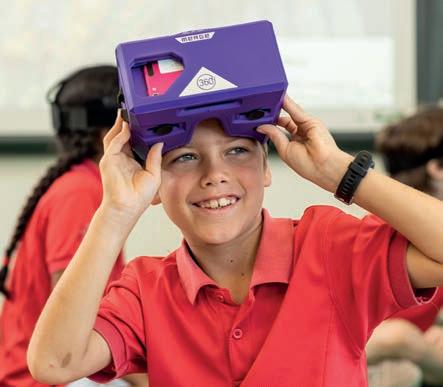
7 minute read
Embedding Wellbeing Supporting staff



EMBEDDING WELLBEING
IN THE WHOLE SCHOOL CULTURE




Mark Steed considers the importance of good mental health amongst staff and students and e plains how wellbeing has been embedded into the curriculum at ellett chool in ong ong.
Wellbeing has been working its way up the agenda in both education and business and industry over the past 20 years. In education, there is a growing recognition that there is little point sending A* students to top universities and on into the workplace if they are not going to cope with the wider challenges that they are going to face there. At the same time, the importance of wellbeing has begun to impact on business thinking beyond its traditional habitat of the HR Department. Over this time, the wider shift in the economy, from the industrial to the digital, has moved the conversation from ‘Health & Safety at work’ (the physical) to ‘Workplace Wellness’ (the mental). The taboo of mental health

For many years, mental health has been a bit of a taboo. Slowly, society is beginning to grasp the scale of its mental health problem. According to research published in The Lancet in 2018, there were an estimated 970 million people globally with mental disorders of whom 264 million were affected by depression. It is generally agreed that the wor place is a signifi cant contributory factor to issues relating to mental health – indeed the World Health rgani ation recently re classifi ed ‘ urnout’ as a disease linked to chronic stress at work.
Tragically, Hong Kong, where Kellett School is based, has one of the highest rates of teenage suicide in the world. Over 120 children and teenagers in the city killed themselves between 2006 and 2015 – accounting in some years for 30% of unnatural deaths for that age group. Great awareness of mental health issues means that rates are falling but each year there are still cases – indeed the educational community here is still reeling from a Year 11 student taking her own life the week before I write.
Given the wider and local contexts, it is not diffi cult to see why ellett has placed a particular emphasis on Wellbeing education
which has become enshrined in our wholeschool programme, Positively Kellett.
Positively Kellett
Kellett School is part of the ‘Positive Education’ movement which is based on the research into the benefi ts of ‘ ositive Psychology’ developed by Professor Martin Seligman at the University of Pennsylvania.
At Kellett, we follow a bespoke curriculum in which all students have one lesson a week to be explicitly taught the skills of Positive Psychology and the science of wellbeing. The aim of this is to foster the attitudes and habits that will enable them to cope with the stresses and strains of life and to thrive in the fast-changing world of the mid-C21. Furthermore, there is evidence that Positive Education delivers better educational outcomes for students. The areas covered include: a growth mindset, a healthy body, a healthy mind, effective communication, a positive sense of self, respectful relationships, and resilience. At Kellett, this approach is not limited to our students but also extends to our teaching and non-teaching staff.
Kellett’s experience
So, what do schools need to do to embed a wellbeing programme into their school? These are the lessons learned from Kellett’s experience.
1. Have an embedded long-term commitment to wellbeing Wellbeing is a top priority at Kellett – it is one of our ‘skyscrapers’ – areas where we devote signifi cant resources and effort and to which we have a long-term commitment. Positive Education is not just a fad – it is fundamental to what we are as an organisation. Clarity over its status ensures that we don’t bounce from one ad hoc initiative to another; but, instead, have a coherent, embedded programme of development.
2. Involve everyone in the programme Staff across the school, from teachers to our administrative team, undertook training led by Geelong Grammar School’s Institute of Positive Education, driving the ethos and energy throughout the school. Sustainability is secured through our advisory team who steer the long-term strategy, and implementation teams who lead the improvement plans. Heads of the Positive Education Curriculum assure quality and champion the work in this area.
3. Build wellbeing into the week Time is one of our most valuable resources, so by setting aside a proportion each week for Positive Education, we are saying as an organisation that we believe in investing in the personal growth and development of those in our community. Student wellbeing is also supported through our weekly Feel Good Fridays, which are designed to send students into the weekend feeling great. They have a tremendous impact on our students at both Prep and Senior level.
4. Hold community events Schools, by their very nature, are places where people, in normal times, come together and thus, they are a focus not only for students but also for the wider community. Our Positive Education programme is for all of our stakeholders. Bringing together students, staff and parents in a variety of educational and participatory wellbeing events has meant that we have developed a shared vocabulary that has benefi ted our whole community.
5. Use regular questionnaires and follow-up At Kellett, we regularly ask our students and staff how they are doing, and if there is anything that we can do to better support them. It is important that we are prepared to listen, spot patterns and embrace suggestions for change.
The key to wellbeing questionnaires is not just about data collection and analysis – it is also about action. We actively follow up in a non-judgemental way. Any student or staff-member who self-reports that their personal wellbeing is at a level less than 5/10 is offered counselling support. We need to encourage people to break the silence and to talk about the challenges they are facing and to give them the support they need.

6. Create a culture of support rofessor artin eligman ipped the traditional question of ‘What is wrong with you?’ to ‘What is right with you?’
Building on this work, Kellett adopts a strengths-based approach to working with our students and staff, which understands success and achievements in terms of character strengths, rather than aws. t is an approach that focuses on life-long growth and development. This is re ected in our Staff Appraisal system which focuses on identifying areas where individuals can develop their professional practice and enhance their skills.
The impact of this has been a change of culture within our staff who are also now more understanding of one another, creating a culture of support throughout our organisation. ●
MARK S. STEED is the Principal and CEO of Kellett School, the British School in Hong Kong; and previously ran schools in Devon, Hertfordshire and Dubai. He tweets @independenthead
What would a 15% cost saving mean for your school?

allmanhall are food procurement experts, specialising in independent education
We currently save schools an average of 15%
Covid-19 and Brexit have made it even more essential to reduce catering costs and expertly manage your food procurement. Ongoing uncertainty and challenges with budgets and fees are the new reality.
We will help.
“...absolute experts in their field, delivering the best food at the best prices along with the best support. We find allmanhall proactive in managing price increases and even decreases, and extremely responsive when needed. Nothing is too much trouble… a truly essential service… a critical partner without whom we could not achieve the support or savings we see today.”
- Chris Ingram, Head of Catering, ACS International Schools










